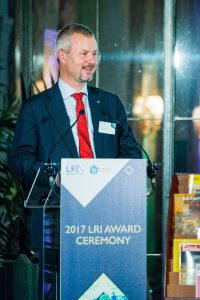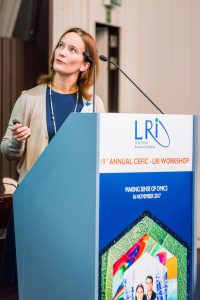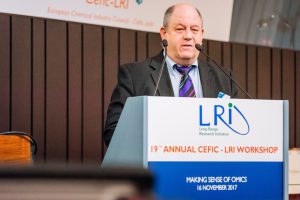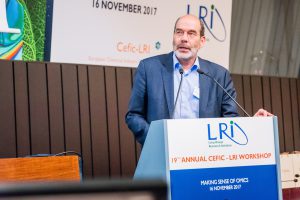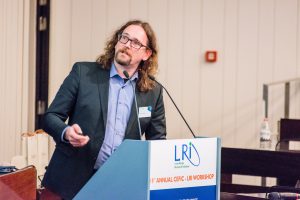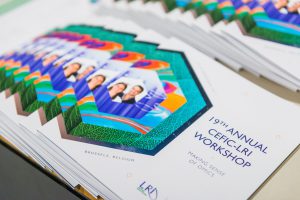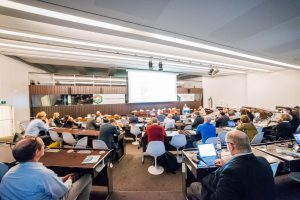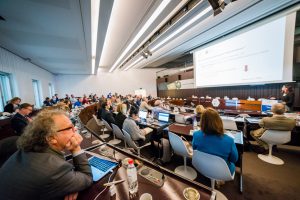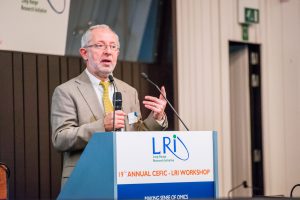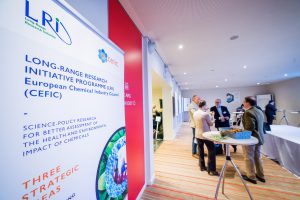The 19th Annual Workshop of Cefic’s Long-range Research Initiative (LRI) programme took place in Brussels on 15 and 16 November with the overall theme of “Making Sense of Omics”. The event kicked off on the evening of 15 November with a gala dinner and the presentation of the 2017 LRI Innovative Science Award. On 16 November, the workshop featured results from key projects, with a focus on environmental and human health questions, and explored how to link data emerging from new ‘omics’ technologies with future regulatory requirements.
Speaking at the LRI award ceremony, Cefic’s Director General Marco Mensink highlighted the importance and value of the LRI for the European chemical industry, describing the Programme as “the telescope for the sector” and a “key link with the science community”.
The EUR 100 000 LRI Innovative Science Award for 2017 was presented to Dr Spyros Karakitsios from the Aristotle University of Thessaloniki for his DOREMI (DOse REsponse to MIxtures) project. It will apply a multi-omics analysis to investigate the potential effect of neurotoxic chemical mixtures, such as heavy metals and plasticizers, on children’s neurodevelopment. Receiving the award, Dr Spyros Karakitsios said: “I am honoured to have been selected for Cefic’s LRI award. It will give a boost to my research career and make a valuable contribution to a safer future for our children”.
The 2016 LRI award winner Dr Wibke Busch from the Helmholtz Centre for Environmental Research presented the results from her winning research project on genome wide profiling of molecular responses related to potentially toxic environmentally relevant chemicals. The work could provide a useful predictor of the toxicological profiling of chemical mixtures.
Watch the video on the 2017 LRI Award Ceremony here.
LRI: a win-win initiative
Opening the scientific discussions on the second day, by Dr Heli Hollnagel of Dow, Chair of the Cefic LRI Issue Group described LRI as a “win-win” initiative. She said that it both “gave industry access to innovative R&D and increased the real-world relevance of academic research”.
The workshop featured new approaches and impacts from the LRI’s diverse project portfolio and included presentations on procedures to establish the toxicity of non-extractable residues; new concepts in the assessment of chemical risk to ecosystems services; the use of chemical activity approaches in hazard and risk assessment; biodegradation; dietary bioaccumulation testing; biotransformation; carcinogenicity and inhalation nanotoxicology.
A poster session of newly launched LRI projects on these topics was also included in the programme of the workshop.
Omics for regulatory applications
A dedicated session on “Making Sense of Omics for Regulatory Applications” discussed the technologies known collectively as ‘omics’ with three perspectives on how to link them with regulatory issues. A view from the US came from Dr Rick Becker of the American Chemistry Council. He described current and future use of omics data for assessing the safety and efficacy of drugs; mode of action pattern analysis for toxicology studies; assessment of adverse outcome pathways; and the use of high throughput transcriptomics screening to enable priority setting for chemical testing.
Dr Aldert Piersma, from RIVM in the Netherlands, outlined the potential for ‘omics’ to enable a “revolution in hazard and risk assessment based on integrated knowledge of the biology of the system that is fit for purpose, and targeted the human directly”. This ethical non-animal based approach could save time and costs. He also noted that both the 2016 and 2017 recipients of the LRI Award were working in the area of omics.
Finally, Dr Hennicke Kamp from BASF examined how management of the data flowing out of ‘omics’ studies should be organised and validated to ensure that quality control was at least equivalent to Good Laboratory Practise (GLP). This was vital for regulatory acceptance and several LRI calls were already addressing this area.
The diversity of the topics covered by the Programme and its visionary nature are well represented in the new Cefic-LRI visual identity, which was unveiled at the workshop. The human image at the core represents human health and well-being as the ultimate goals of LRI.
For more information on the workshop, please consult the final report of the event here.
PRESENTATIONS:
DAY 1
2017 Award project plans: DOREMI project
DAY 2
Fit-for-purpose exposure scenarii in Como
US Perspective on use of Omics
Omics, ontologies and computational approaches in innovative chemical hazard and risk assessment




